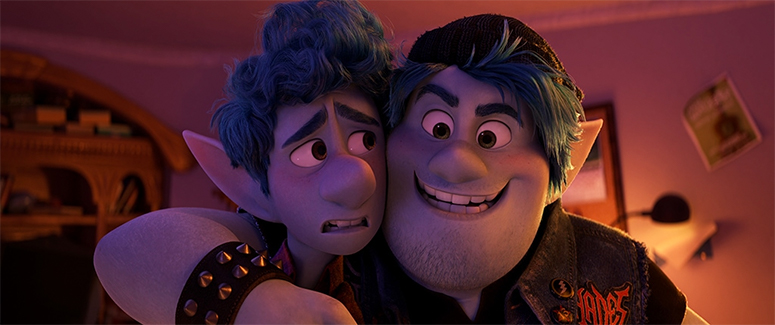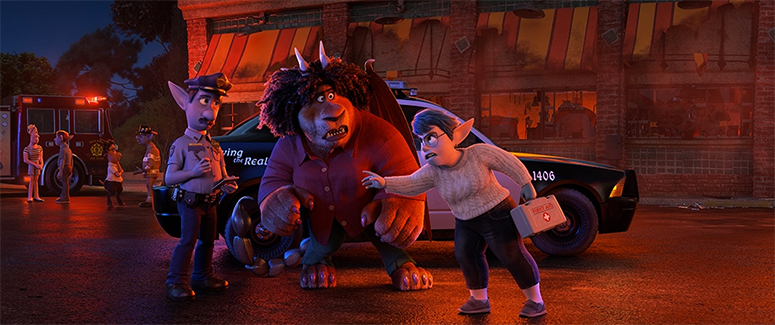‘Onward’ is an adventure of a lifetime with a whole lot of heart
I’m the eldest of three boys. It was a crazy household growing up – taekwondo sparring to settle fights, conspiring to get out of chores, the works.
We’re all in our 20s now, a bit more sensible, thankfully, and all living in different places: a Sunday lunch every now and then, but not a commitment set in stone.
On a weekend that we did, the three of us went on the road without our parents for the first time. With my younger brother on the wheel, me riding shotgun, and the youngest in the backseat, we sort-of sneaked out with a new car of ours. Not someplace far, but far enough to make us feel we got away with something. As mundane as it sounds, it’s one of the best memories with my brothers.
It’s rare to see that kind of specific feeling — that brotherly bond — captured in an animated film. We’ve got the Toy Story franchise or Monsters University, but those are buddy comedies: more about the family we choose, than the family we were born into.
Come to think of it, it’s only Frozen that puts siblings at the forefront, but they spend so much of that movie apart. It doesn’t quite get the sibling dynamic of spending every day together, living in the same spaces, and secretly treasuring memories as ordinary as they come — Disney and Pixar’s latest offering, Onward, revels in these, and in a whole lot more.
It’s an actual, Dungeons and Dragons quest level of quest — there’s a manticore, a gelatinous cube that disintegrates anything in its way, a biker gang of sprites — to attain another Phoenix Gem to redo the spell.
Set in a world that once exclusively used magic, teenage elf Ian Lightfoot (voiced by Tom Holland) is celebrating his 16th birthday, which also meant another year his dad has passed. Along with his brother Barley (voiced by Chris Pratt) who was too young to remember their dad, they both get a gift from him: a wizard’s staff, along with a Phoenix Gem and a resurrection spell, that can bring him back for a day. The spell only half-works — literally only his lower half is revived — and they go on a quest to “complete” their dad before the sun sets.

I’m not using quest here as a synonym: it’s an actual, Dungeons and Dragons quest level of quest — there’s a manticore, a gelatinous cube that disintegrates anything in its way, a biker gang of sprites — to attain another Phoenix Gem to redo the spell. In true quests fashion, there’s a lot to work with when it comes to the adventure aspect of the film — beat-up road trip material and 1970s van included.
A particular scene, where Ian has to cross a ravine using an invisible bridge spell, had the whole audience on the edge of their seats. A lot of narratives like single (and gay!) parenting and tearing down historical sites make appearances too, but they’re never forced.
And yet with the spectacular visuals, the best of Onward lies within its story of family and loss.
A scene in the first half of the movie, where Ian plays a cassette recording of his dad’s end of a conversation and Ian fills in the gaps with his own words, sets the tone of the proceedings: this is a person dealing with, more than his own grief, growing up not knowing what his dad was like. He finds comfort in wearing his dad’s old college sweatshirt, and in conversations about what his dad was like.

In the course of the film, Ian even makes a to-do list of what he’ll do with his dad as soon as the spell’s completed — from the ordinary father-son bonding of learning how to drive, to a more poignant sharing-what-his-dad-missed conversation.
Barley’s got his own regrets, too, like not being able to say goodbye properly when it was time to. All of these don’t play out in a soap drama way: they just happen, like in real life, in little manifestations of coping, and realizing the sadness really never does go away completely — you know, in the spirit of Disney and Pixar filmography (Inside Out and Coco are great examples) — but it does get replaced somehow.
There’s a scene in the film when Ian takes a look at the speedometer, and asks what the “O” is for — with that moment, I’m back with my brothers in the car, trying to figure out how fast my brother’s going down the parking lot.
Our parents have no clue what we’re doing, and I had no idea my brother drove down this fast. I just see a “0,” our youngest brother clutching an armrest, and my other brother gleefully grinning. I lean back in my seat smiling, making a mental note to tell our parents about this one day, and look on.


